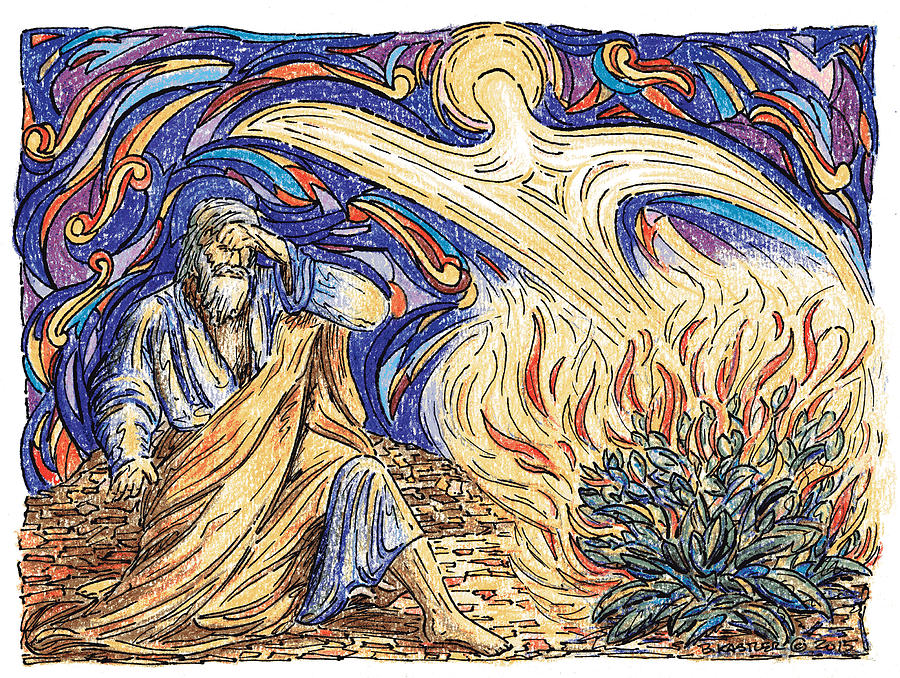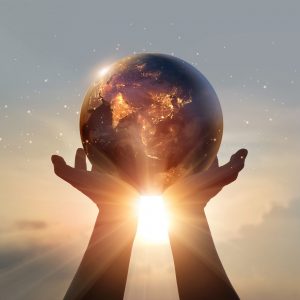Rachael writes: At the burning bush, Moses is called to make a change (Exodus 3.1-15). He’s essentially been in hiding in Midian, enjoying the quiet and humble life of a shepherd and raising his family in relative safety. He knows the plight of his fellow Israelites but he has left them behind. Perhaps it seemed too big a battle for one person, especially one whose self-confidence is non-existent and who describes themselves as “slow of speech and slow of tongue”.

It’s the perfect story to start the season of creation with: the burning bush (forest, home, town) is an image that we are sadly now all too familiar with. In Hawaii, Canada, Greece, Kazakhstan, Chile, even here in Scotland. Millions of hectares, hundreds of lives. Each one is a reminder for those of us living in relative safety of the plight of the planet. The battle can seem too big for any one of us, even a small group of us, especially when we doubt the power of our own actions and voices, when we think of ourselves as slow of speech or tongue. But we too are being called to make a change.
God says to Moses, “I have observed the misery [and] heard their cry on account of their taskmasters”. “Who am I that I should go?” Moses replies. “I will be with you” God assures him.
What precisely does that call look like for us in 21st century Scotland, facing the issue of global environmental catastrophe, rather than one man 1000 – 1500 years before Christ going head to head with the ego of a despot?
It’s not a new call. Actually, we really need to rediscover the calling given us at our creation, as part of creation: our calling to serve. Humanity was ordained not to be masters or even custodians (that’s God’s job) but to be the servants of creation. To till and keep the earth. Not abuse or destroy it for our own gain. Somewhere (that we might call The Fall) we lost sight of that. Where we should have been servants, we thought ourselves masters. Where we should have grown a garden, we made ourselves gods.
The Office for National Statistics figures show that the median annual income for a man in 1973 was just short of £2000. The average price of a house in June that year was a little over £8000. Today the average annual salary is about £20,000 and the most recent figure for the average house price in the UK is £286,000. And our expectations of those very expensive houses are very different to 1973. Not just a fridge freezer but a spare freezer in the garage for a rainy day. A TV, not just one but one in almost every room, with not just 3 channels but 100s plus every streaming service going. Central heating in every room. At least one car, probably two, on the driveway. And many of us expect to leave that home on holiday for a week or so, multiple times a year, and on at least one occasion to go abroad. We add smart devices, robot lawnmowers, and self-cleaning toilets. We have guest rooms that we pray no one asks to use because we have a permanent guest called Clutter and their friend, Extra Storage.
Desmond Tutu once wrote “The taste of “success” in our world gone mad is measured in dollars and francs and rupees and yen. Our desire to consume any and everything of perceivable value – to extract every precious stone, every ounce of metal, every drop of oil, every tuna in the ocean, every rhinoceros in the bush – knows no bounds. We live in a world dominated by greed. We have allowed the interests of capital to outweigh the interests of human beings and our Earth.”
The only counter to such greed, to such consumption, the only thing that can save the planet now, is restraint. This is the new cost of living: to deny ourselves. For what will it profit us to gain the whole world, but forfeit our life?

Jesus tells us to set our minds on divine things, not human (Matthew 16.21-28). And if we set our minds on the Divine Christ, we see again that same call. For Christ came not to be served but to serve, to lay down his life for his friends, to make himself nothing and take on the nature of a servant.
There are two things I think that looks like at this time. The first is to realign our thinking so that human flourishing looks like compassion and altruism and community, not growth of numbers, productivity, or money. The second is to truly inhabit such thinking and find a way to give away what we have. To tithe, to share. To live out of abundance and generosity. John Bell, of the Iona Community, said at Greenbelt that for years he has had a note stuck to his front door which he sees every time he leaves the house and that it says “Give something away today”. And he has, every day. And he’s never missed a single thing.
Life is not found in what we possess. The more we buy, the more we are bought. But life is found in what we give. What will we give in return for our lives and the life of the planet?
We pray:
God Most High, maker of heaven and earth, you created humankind in your own image and entrusted the whole world to human care: give us grace to serve you faithfully, that we might be trustworthy stewards of your creation, through Jesus Christ our Lord, who lives and reigns with you and the Holy Spirit, one God, now and for ever. Amen.






